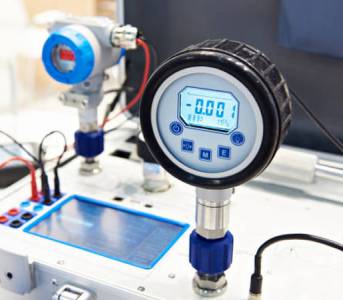Description
Calibration: Ensuring Accuracy and Reliability
Calibration is the process of comparing a measuring instrument's readings to a known standard to ensure accuracy and reliability. This critical process is essential across numerous industries, from manufacturing and healthcare to environmental monitoring and research. Without regular calibration, instruments can drift from their original specifications, leading to inaccurate measurements, flawed results, and potentially costly consequences.
What Calibration Offers:
- Accuracy: Calibration guarantees that your instruments provide readings within acceptable tolerances of the established standard. This minimizes measurement errors and ensures data integrity.
- Traceability: Calibration establishes a clear chain of custody, linking your instrument's accuracy back to national or international standards. This provides evidence of compliance with regulatory requirements.
- Reliability: Regular calibration helps identify and correct instrument drift or malfunction before it impacts your operations, ensuring consistent and trustworthy results.
- Compliance: Many industries have strict regulatory requirements for calibration, ensuring adherence to quality standards and avoiding penalties.
- Efficiency: Accurate measurements lead to improved efficiency in processes, reduced waste, and optimized resource allocation.
- Safety: In critical applications, accurate measurements are essential for ensuring safety and preventing accidents.
Types of Calibration:
Calibration services can be tailored to specific needs and instruments, including:
- On-site Calibration: Technicians visit your facility to calibrate your instruments in their operating environment. This minimizes downtime and ensures minimal disruption.
- Laboratory Calibration: Instruments are sent to a specialized laboratory for calibration using high-precision equipment. This option often offers higher accuracy and detailed documentation.
- In-house Calibration: Some organizations maintain their own calibration laboratories and personnel. This allows for quicker turnaround times but requires significant investment in equipment and training.
Choosing the Right Calibration:
The choice of calibration method depends on factors such as:
- Instrument type: Different instruments require different calibration techniques and standards.
- Accuracy requirements: The level of accuracy needed dictates the type of calibration and the frequency of calibration checks.
- Regulatory requirements: Compliance standards often specify calibration requirements.
- Budget: On-site calibration may be more expensive but can be more cost-effective in the long run by minimizing downtime.
Benefits of Professional Calibration Services:
Professional calibration services offer:
- Expertise: Experienced technicians use specialized equipment and follow established procedures to ensure accurate and reliable calibration.
- Certification: Calibration certificates provide verifiable evidence of the instrument's accuracy and traceability to national or international standards.
- Reduced Risk: Professional services minimize the risk of errors and ensure compliance with regulatory requirements.
- Peace of Mind: Knowing your instruments are accurately calibrated provides confidence in the quality and reliability of your data.
Conclusion:
Calibration is not just a cost; it's an investment in accuracy, reliability, and compliance. Regular calibration ensures the integrity of your measurements, minimizes risks, and contributes to the overall success of your operations. Choosing a reputable calibration provider is crucial to guaranteeing the quality and validity of your results.
